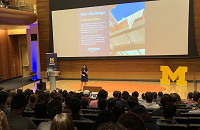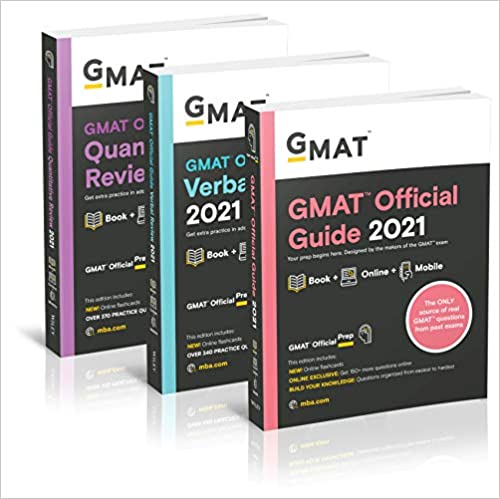1. Your GMAT Score is the Most Important Element of Your Application
It's sad, but it's true: your GMAT score is probably the most important factor in determining whether you will be admitted to a top-tier business school. I need to clarify that statement, though.
Most applicants believe there's a significant difference between a 680 and a 720 on the test. There isn't. The extra 40 points won't dramatically improve your chances of being admitted. That's why I'm frustrated when I hear from people who already have an acceptable score but insist on retaking the exam. Most of them would be better served by burning their GMAT prep books and turning their attention to the application essays.
If you hope to have a reasonable chance of being admitted to a top program, though, your GMAT score will need to be "in the ballpark." If it isn't, you'll have a hard time winning a spot at top-tier schools no matter how good your work experience and undergraduate GPA might be. That's why I believe GMAT score is the most important factor in being admitted to a top program. If your score isn't in the ballpark, you won't be in the game.
So What's Considered "In the Ballpark?"
At virtually all the top programs, the ballpark now starts in the mid to high 600s. That doesn't mean there's a strict cut-off; there isn't. But if you look closely at top schools' numbers, you'll see that below about 660 your chances of being admitted fall pretty dramatically.
To determine whether you're a viable candidate at a specific school, find the program's "middle 80 percent" GMAT range. Virtually all schools now report this data. If you're within a school's 80 percent range, you have a reasonable chance of being admitted. And you may be viable even if you're below the range. You should never let your GMAT score be the sole factor that determines where you apply. Simple math dictates that 10 percent of students attending MBA programs scored below the schools' reported 80 percent range (and 10 percent scored above it).
One of the most common mistakes that MBA applicants make when selecting schools is using median GMAT scores as a viability gauge. If, for instance, a program's median score is 690, applicants believe they have to hit that number in order to be admitted. It should be obvious that half of the current class fell below 690, but that doesn't seem to register and some applicants self-select out. I've talked many applicants into applying to MBA programs they are now attending (or have already finished) because they were initially discouraged when their GMAT scores fell slightly below their target schools' medians.
The Bottom Line: Don't let the numbers intimidate you. Use the 80 percent range, not the median GMAT value. If you're slightly below the 80 percent range, apply anyway. Ten percent of your classmates next year will be in the same boat.
Are the Separate Scores for Math and Verbal Important?
Yes, especially the math score. The admissions people put a lot of emphasis on math skills when making their decisions. So it's important that you do well on the math portion of the GMAT.
The math and verbal scores range from 0 to about 52. (I know that GMAC claims the scale can go as high as 60, but it has never actually gone over 52). The strongest students are those in the "40-40 Club." That means they score in the 40's in both math and verbal.
It's great to have that kind of balance, but if you're going to be stronger on one portion of the test than on the other, it's clearly better to be stronger in math.
What if I Hope to Apply to Top Schools But My GMAT Score is Below 600?
You need to take the test again. I'm not saying that you can't get into a top program — you can — but your chances are slim. So if you have time to take the test again, you'd be foolish not to.
And that brings up a good point about multiple test scores. I'm not aware of a single top school (or even an average school) that still averages GMAT scores. I'm sure that someone out there will find a program that does so, but until I hear from that person, let's stick to the general rule: schools consider only your highest GMAT score.
Can I Take the Test 15 Times and Report Only My Highest Score?
Sort of. Before the GMAT exam begins, the computer will ask which schools you would like your scores forwarded to. You get five schools included in the cost of the test, and any additional programs will cost you $25 each.
You can elect not to have your scores forwarded to any schools. After you have seen your scores (you get them immediately after finishing the test), you can then pay $25 each to have them sent to the schools you choose.
Your 'GMAT transcript' will report only your three most recent scores. So if you took the test four times and scored 450 each time, but didn't have your scores forwarded, you could still pull off that miraculous 700 the fifth time and then send your scores. The admissions office would see only two 450's and a 700.
It doesn't really matter, though, whether you send your transcript after each test or wait until you score the number you want. In the end, the applications will ask you to specify the score you want the admissions committee to consider. (And, no, you can't mix and match your best verbal score and your best math score from different tests.)
(By the way, the cost of the final pencil-and-paper test was $84 and additional score reports were $10 each. Now it's $275 and additional score reports are $25 each.)
What About the Essay and Integrated Reasoning Scores?
They aren't being used. Schools won't admit that, but I will. The GMAT essay section (the 'AWA') has been a failure, and the Integrated Reasoning section has been just as worthless.
I teach my students how to do well on both sections, but I also tell them not to put in a lot of time on them. It's better to focus on the math and verbal sections that make up your overall score.
What About Taking the Exam Under "Non-Standard Accommodations?"
Most people don't know that they can take the GMAT with what is called "non-standard accommodations." That means you can get twice as much time as everyone else, if that's what you need to compensate for a medical condition. GMAC doesn't promote this accommodation very aggressively, but I've had many of my students take the test "non-standard" and all of them who have gotten a truly significant accommodation (such as double time) have gone up at least 100 points from what they were scoring with me on practice tests given under standard conditions.
I had one student who consistently scored in the mid 500s with me. He took the test under non-standard conditions (he got double time), went up more than 100 points, and was accepted at Harvard. I don't think Harvard would have taken him in the mid-500s, so the special accommodations worked out particularly well for him (as did HBS).
Should I Take a GMAT-Prep Course?
If you hope to go to a top-tier school, you'd be crazy not to prepare for the GMAT. Being admitted to Kellogg or Columbia or Stanford or a similar school is well worth the time and money invested in a good prep course.
I don't want to steer you toward one company over another, but I would suggest that you take the longest, most comprehensive course available in your area. And look for a good instructor. A good teacher can reveal subtleties about the test that aren't written into any book, and just having the structure of a class will force you to work harder than you would if you studied on your own.
The Bottom Line On GMAT Scores
Perfect GMAT scores are surprisingly rare at the top business schools. Every year I'm shocked to see the highest reported score at Stanford, Harvard, Wharton, Kellogg, Columbia and the other top schools because it's typically a 790 or 780 or even a 770. Getting a perfect GMAT score isn't terribly difficult if you're willing to work (ask my students how hard I work them), but it also isn't necessary and you shouldn't waste your time prepping for points you don't need.
Take the GMAT very seriously, though. If you score 560 you won't be going to Wharton, and all of your excuses for not finding time to study will be little consolation. Work hard in your course! And if you don't like your first score, take the test again. Keep taking it until you get the score you want.







